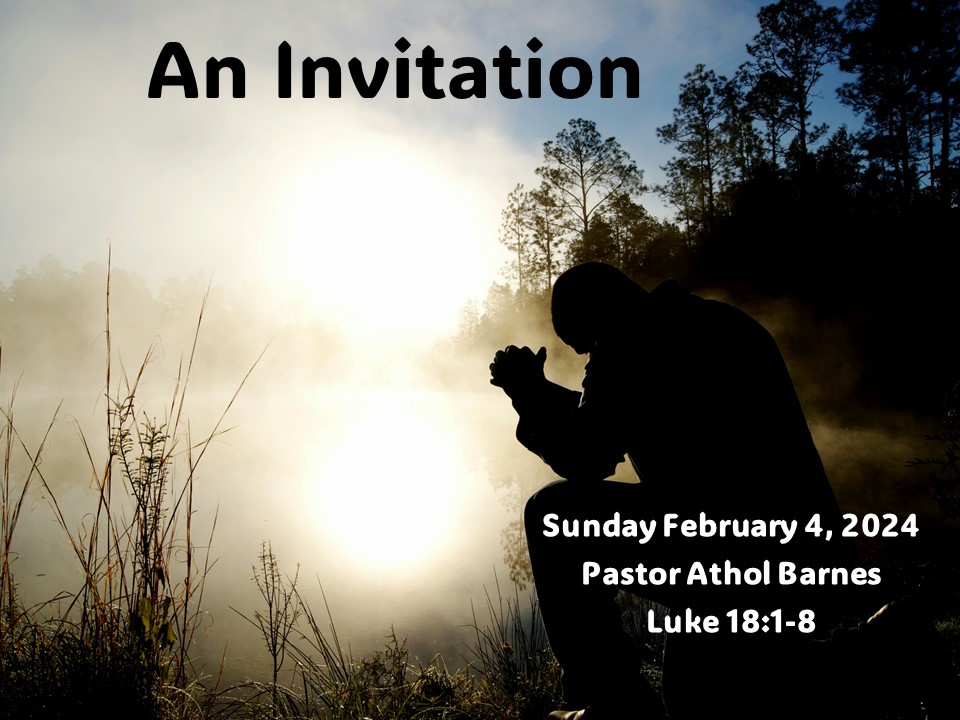
In Luke 18, Jesus was walking with his disciples heading to Jerusalem, teaching them as he went. In the first section of chapter 18, Jesus tells them a parable to teach them about prayer, encouraging them in verse 1 to, “…always pray and not lose heart.”
To pray is like breathing for a Christian, it is essential for our life. Without prayer, we will lose heart, we will grow spiritually weak.
Unless we are sick with a lung infection or drowning, we rarely think about our breathing; we just do it. Likewise with prayer, it should be the natural habit of our lives, the breath we breathe for our spiritual life.
Prayer is more than saying words, it is a deep relationship with God, our heart is constantly aware of the presence of our Lord.
To illustrate his teaching, Jesus uses what seems to be a confusing parable. Jesus uses the story of a desperate widow and an unrighteous judge to illustrate the need for prayer.
But in order to understand this parable, we must understand that God is not represented by the judge, and in the same way, you and I are not represented by the poor widow. They are both extreme contrasts, Jesus is using hyperbole to make his point.
The circuit judge of the first century would not hear everyone’s case, rather, he would choose who he would hear, and in many cases his decision was precipitated by a bribe of some sort.
Jesus is stating the contrast between the judge and our Heavenly Father. God is not like this judge. God is loving and generous, and He is intimately aware of our needs before we bring them to Him. God doesn’t need to be persuaded to hear His children’s pleas; He answers prayers because it is for His glory.
But what about the poor widow in the parable?
Widows seldom got justice and were treated poorly by the culture. Jesus was making a contrast between this widow and the position of believers.
Let’s look at five contrasts between our situation and this parable. Our standing and hers.
- This widow was a stranger, she came before the judge, but he didn’t know her or her situation. In contrast, we are God’s children, and He knows everything about us.
- This widow had limited access to the judge and had to wait for an audience with him. We, on the other hand, have unlimited access, in fact we are invited into the presence of God every minute of every day (see Ephesians 3:11-12).
- This woman had no friend and no advocate who would help her in her appeal. In contrast, as Christians, we have an advocate. We have someone who never rests and always advocates for us (see 1 John 2:1 and Hebrews 10:19-22).
- This widow had no promise of being heard, but we have the precious promises of the word of God. In addition to the promises of God’s word, we have the Holy Spirit who helps us in our prayers (see Romans 8:26-27).
- But perhaps the greatest contrast is that this widow came to a court of law trying to get justice. But as God’s children we don’t come to a court of law, we come to the throne of grace (see Hebrews 4:15-16).
The point that Jesus makes so clearly is that if we don’t take advantage of the invitation to pray, spiritually, we will be just like this poor widow. We are invited to the throne of grace in prayer.
In contrast with the unrighteous judge, God is infinitely good and infinitely just (see Luke 18:7).
God chose you, not to abandon you or to ignore you in your time of need, He is always near as He promises in His word.
As Jesus concludes this parable, he makes it clear that it is all about faith. Luke 18:8b reads, “…nevertheless, when the Son of Man comes, will he find faith on earth?”
Jesus is asking us the same question today; will he find faith in us?
This is a challenge to us in our twenty-first century environment, do we really have faith? In our world, we are pretty good at solving problems. We have a solution or an answer for almost everything, and if we don’t, we can “google” it.
We are good at engineering God out of the picture. “…Will He find faith on the earth?”
God will use people and natural resources to provide for our needs, but we must ask Him. In fact, we are invited to ask Him.
What is your need today? What are you waiting on God for?
But what do you do when God doesn’t answer your prayer? When the miracle doesn’t happen quickly? These are difficult times, times of testing and growing in faith. When Jesus taught on prayer in Matthew 7:7-8, he said that we need to be continuously asking, seeking, and knocking. The verb tense is one of ongoing action.
Jesus encourages us to persist in prayer, not because he needs to hear the same request dozens of times before he answers. Rather it is in persistently going back to the throne of grace that we grow in our relationship with our Lord. If we immediately received everything we prayed for, God would not be good, and we would treat Him like a vending machine. God is after a relationship and His glory being displayed.
Sometimes God has to say no because He knows what is best for us.
We are invited to pray, what have you stopped praying for?
I encourage you to keep on praying; our Heavenly Father is perfectly good in all His ways.

